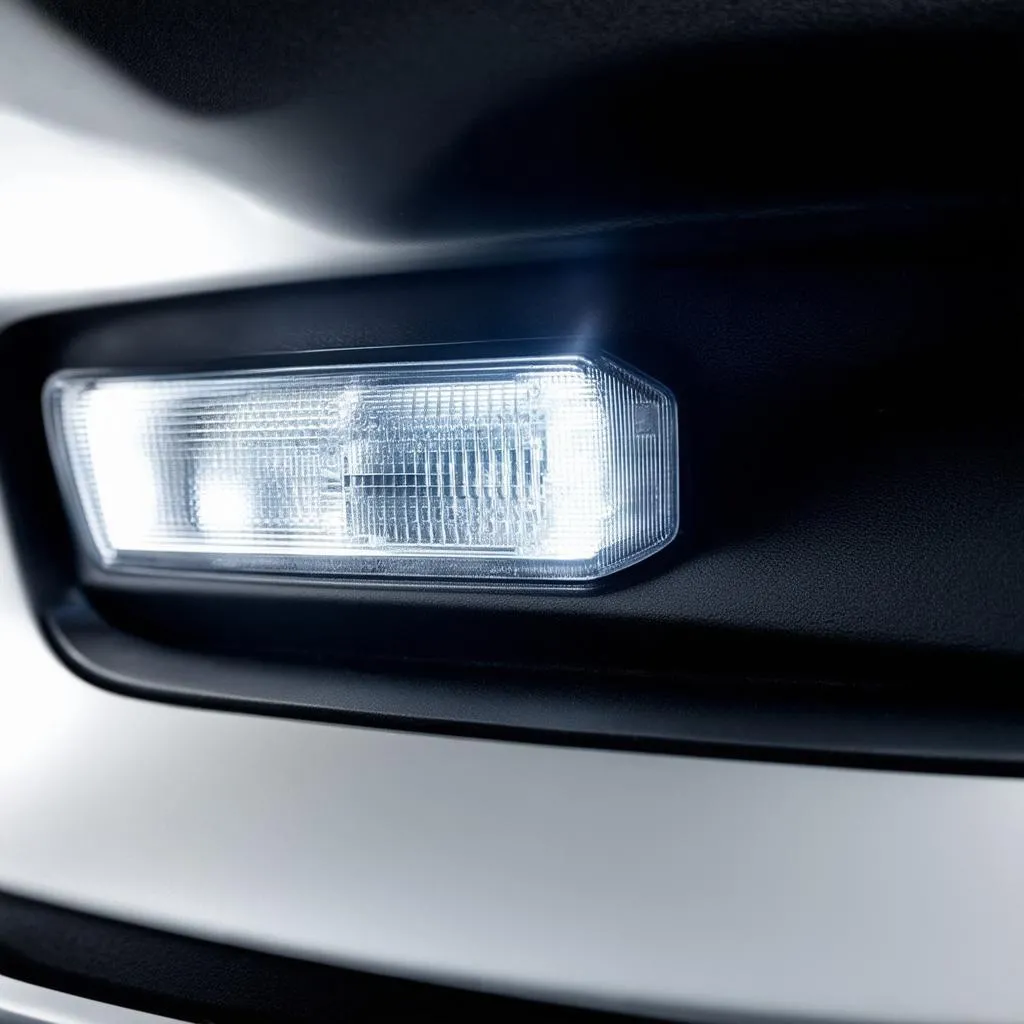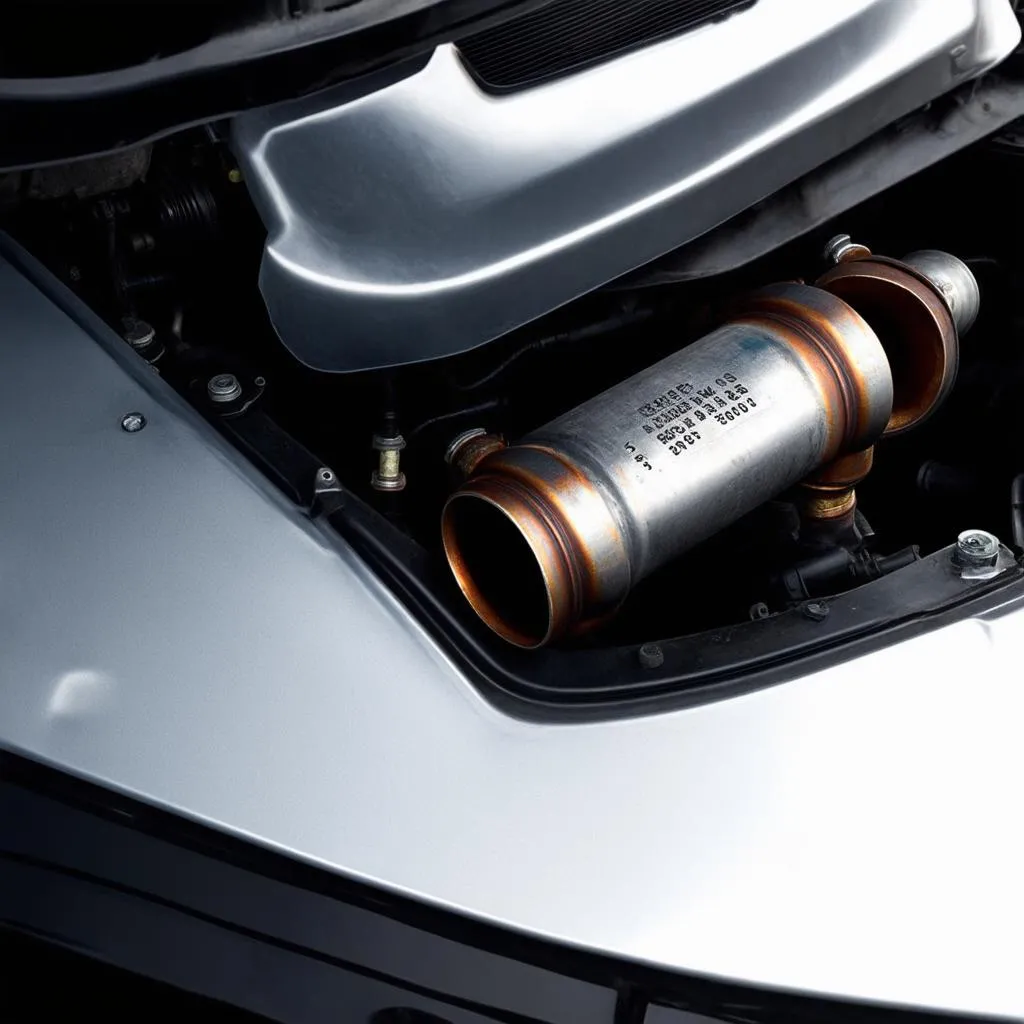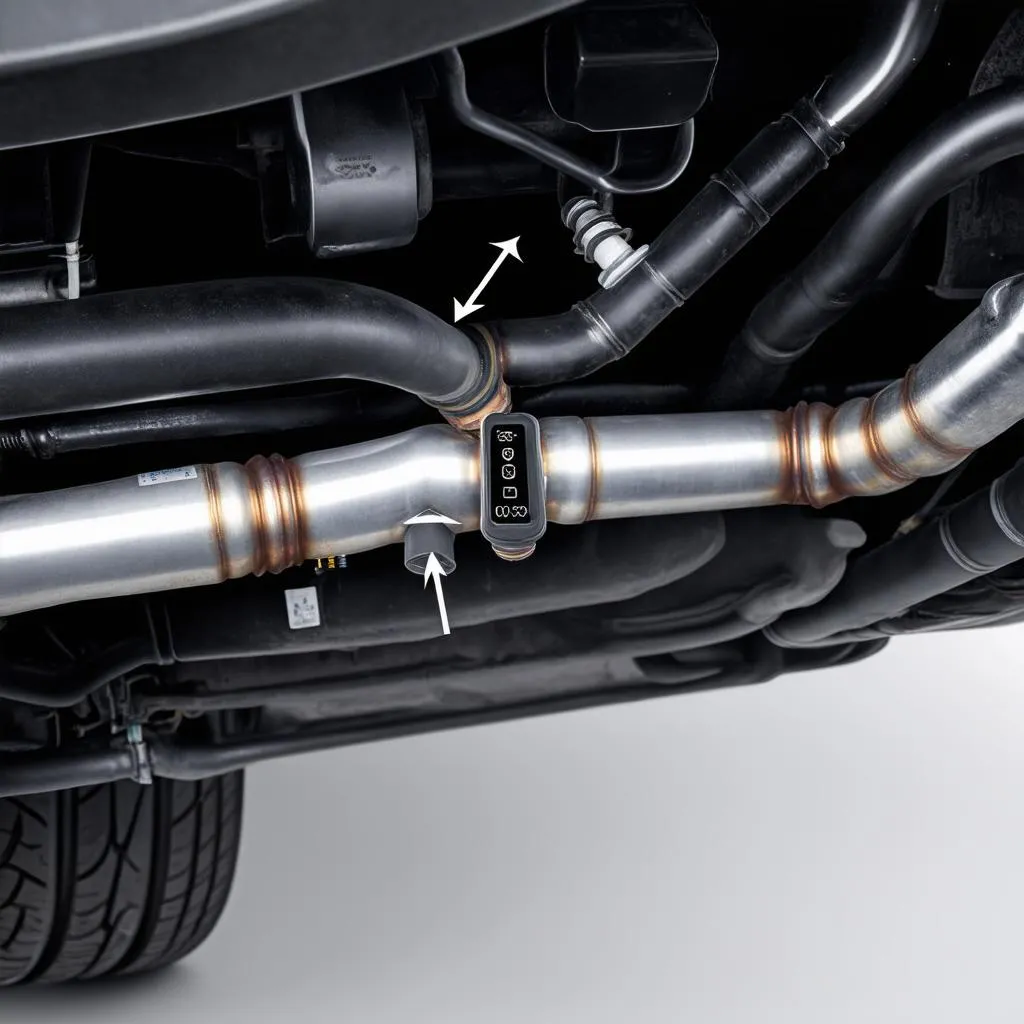BMW P0420: Understanding the Code and Troubleshooting Your Car
Have you ever been driving your BMW and noticed the check engine light come on? It can be a bit of a scare, especially if you’re not sure what the problem is. One common code that pops up is P0420, indicating a problem with the catalytic converter. But don’t worry, this article will help you understand what this code means and how to fix it.
What Does BMW P0420 Mean?
The P0420 code is a standard diagnostic trouble code (DTC) that signals a problem with the catalytic converter efficiency in your BMW. The catalytic converter is an essential part of your exhaust system, responsible for reducing harmful emissions. It’s like a little chemical factory that turns harmful pollutants into harmless gases.
Understanding the Code from a Technical Perspective
The catalytic converter’s efficiency is measured by sensors that monitor the amount of oxygen in the exhaust gases before and after the converter. If the sensors detect a significant difference, it means the catalytic converter is not performing as efficiently as it should.
What is the Connection Between the P0420 Code and the Catalytic Converter?
The catalytic converter is a vital component of the exhaust system, designed to reduce harmful emissions from the engine. The P0420 code specifically points to a problem with the efficiency of the catalytic converter, meaning it’s not converting harmful pollutants into less harmful gases effectively.
What is the Connection Between the P0420 Code and the Oxygen Sensors?
The P0420 code is triggered by the oxygen sensors in your exhaust system. The sensors constantly monitor the oxygen levels in the exhaust gases before and after the catalytic converter. If the difference in oxygen levels is too great, it indicates a problem with the catalytic converter’s efficiency.
Why is the P0420 Code Important?
This code is important because it indicates a potential problem with your car’s emissions system. A malfunctioning catalytic converter can lead to increased emissions, which is harmful to the environment and may even trigger legal issues depending on your location. It’s important to address this issue quickly for your health and the environment.
What are the Symptoms of a P0420 Code?
Besides the check engine light, you may notice other symptoms accompanying the P0420 code. These can include:
- Reduced engine power: A damaged catalytic converter can restrict exhaust flow, leading to a loss of power.
- Rough idling: The engine might idle erratically or stall.
- Increased fuel consumption: Inefficient catalytic converter operation can cause the engine to run richer, resulting in higher fuel consumption.
- Strong exhaust odor: You might notice a stronger smell of exhaust fumes.
It’s important to note that not all cars with a P0420 code will experience these symptoms. However, if you notice any of these, it’s essential to get your car checked by a mechanic.
How to Troubleshoot the P0420 Code
If you’re facing a P0420 code, don’t panic! You can start troubleshooting it yourself.
Here are a few things you can try:
-
Inspect the catalytic converter: Look for any visible damage, cracks, or blockages in the catalytic converter.
-
Check the oxygen sensors: Inspect the oxygen sensors for any signs of corrosion, damage, or loose connections.
-
Inspect the exhaust system: Look for leaks or blockages in the exhaust system.
-
Use a diagnostic scanner: Use a diagnostic scanner to retrieve any stored codes and information that might shed light on the problem.
-
Reset the check engine light: Once you’ve addressed any issues, reset the check engine light using your diagnostic scanner or by disconnecting the battery for a few minutes.
If you’re not comfortable with any of these steps, it’s best to take your car to a qualified mechanic.
Can a P0420 Code Be Ignored?
While you might be tempted to ignore the check engine light and hope the problem goes away, it’s not a good idea.
- Environmental impact: A faulty catalytic converter can release harmful emissions into the environment, contributing to air pollution.
- Legal issues: In some jurisdictions, driving a vehicle with a faulty catalytic converter can result in fines and legal penalties.
- Further damage: Ignoring a P0420 code can lead to further damage to the engine and exhaust system.
It’s best to get the problem diagnosed and repaired as soon as possible to protect your health, the environment, and your car.
How Much Does it Cost to Repair a P0420 Code?
The cost to repair a P0420 code can vary significantly depending on the cause, the make and model of your car, and the location where you get the repairs done.
Here are some possible scenarios:
- Replace the catalytic converter: This is the most common repair, and it can range from a few hundred dollars to several thousand dollars, depending on the type of converter needed.
- Replace the oxygen sensors: If the oxygen sensors are faulty, replacing them can be a more affordable option, costing around a few hundred dollars.
- Repair exhaust leaks: If there are leaks in the exhaust system, fixing them might be a simple and less expensive repair.
- Replace the fuel injectors: In some cases, faulty fuel injectors can contribute to the P0420 code, and replacing them can be a costly repair.
It’s essential to get a proper diagnosis from a trusted mechanic to determine the root cause of the P0420 code and get an accurate estimate of the repair costs.
What are some Other Common BMW Codes and Their Meaning?
Besides P0420, there are other common BMW codes that you might encounter. These include:
- P0171: Fuel System Too Lean (Bank 1)
- P0174: Fuel System Too Lean (Bank 2)
- P0300: Random/Multiple Cylinder Misfire Detected
- P0440: Evaporative Emission System Malfunction
- P0455: Evap System Leak Detected
These codes point to specific issues within the car’s engine or emissions system, and understanding their meaning can help you diagnose and repair the problem effectively.
What are the Common Causes of a P0420 Code?
The P0420 code can be caused by various factors. Some of the most common causes include:
- Faulty catalytic converter: This is the most common cause of a P0420 code.
- Faulty oxygen sensors: These sensors measure the oxygen levels in the exhaust gases, and if they fail, it can trigger the P0420 code.
- Exhaust leaks: Leaks in the exhaust system can affect the catalytic converter’s efficiency and cause the P0420 code.
- Fuel system problems: Issues like a clogged fuel injector or a faulty fuel pressure regulator can also trigger the P0420 code.
- Engine problems: In rare cases, engine problems like a misfire can also contribute to the P0420 code.
How to Prevent a P0420 Code
While you can’t completely prevent a P0420 code, there are steps you can take to minimize the risk of it happening. These include:
- Regular maintenance: Regularly servicing your car and following the manufacturer’s recommended maintenance schedule can help prevent many potential problems, including those related to the catalytic converter.
- Use high-quality fuel: Using high-quality fuel can help keep your catalytic converter clean and running efficiently.
- Avoid aggressive driving: Excessive acceleration and hard braking can put extra stress on your engine and exhaust system, increasing the risk of damage to the catalytic converter.
- Avoid driving on rough roads: Driving on rough roads can damage the catalytic converter and exhaust system, so try to avoid them if possible.
What to Do When You Get a P0420 Code
The best course of action when you get a P0420 code is to take your car to a qualified mechanic for diagnosis and repair.
Here are some tips for getting the best service:
- Choose a reputable mechanic: Look for a mechanic with a good reputation and experience working on BMWs.
- Ask for a diagnosis and repair quote: Get a detailed diagnosis and repair quote before agreeing to any work.
- Consider the cost of repair: If the cost of repair is significant, you might want to consider getting a second opinion from another mechanic.
Where Can I Learn More About P0420 Code and Other BMW Codes?
There are many resources available online and in print that can provide more information about P0420 code and other BMW codes.
- Online forums: You can find many online forums dedicated to BMWs where owners share their experiences and knowledge about different codes.
- BMW manuals: The owner’s manual for your specific BMW model can provide detailed information about codes and troubleshooting.
- Mechanic websites: Many mechanic websites offer articles and resources on different codes and how to diagnose them.
I’m Not Sure If I Can Fix My P0420 Code Myself. Where Can I Get Help?
If you’re not comfortable troubleshooting and repairing your P0420 code yourself, don’t worry. We can help! Contact us at +84767531508 via Whatsapp and our team of experts will be happy to assist you in getting the problem diagnosed and fixed quickly and efficiently.
 P0420 Code Check Engine Light
P0420 Code Check Engine Light
 P0420 Code Catalytic Converter
P0420 Code Catalytic Converter
 P0420 Code Oxygen Sensors
P0420 Code Oxygen Sensors
Conclusion
The P0420 code is a common issue that BMW owners face. While it can be a bit of a hassle, understanding what it means and how to troubleshoot it can save you time, money, and stress.
If you’re not sure how to address the issue, our team of experts at cardiagxpert.com is here to help. Contact us via Whatsapp at +84767531508 and we’ll provide you with personalized assistance.
Remember, getting your car repaired promptly is important for your health, the environment, and the longevity of your vehicle. So don’t delay! Get in touch with us today and let us help you get back on the road quickly and safely.
We hope this article has been informative. Please leave a comment below if you have any questions or feedback. And be sure to check out our other articles on car diagnostics and repair.
